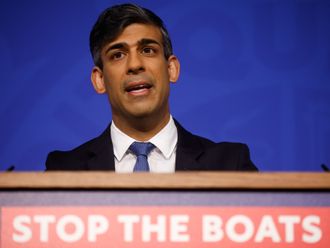LONDON: Britain's main political parties are not giving voters important details of how they would run the public finances after the May 7 national election, the Institute for Fiscal Studies, an independent think tank, said on Thursday.
The election offered voters the biggest differences over fiscal policy since at least 1992, the IFS said.
"The electorate has a real choice, although it can at best see only the broad outlines of that choice," said Carl Emmerson, deputy director of the independent IFS think-tank.
Prime Minister David Cameron's Conservative Party wants to eliminate the budget deficit without raising taxes by 2019. The main opposition Labour Party has looser targets to balance the books and plans on offsetting spending cuts with tax increases.
Voters put the future of the economy near the top of their list of priorities.
Both the main parties remain neck and neck in opinion polls, with neither likely to win an outright majority.
The IFS sad Conservatives needed to provide clarity on an unspecified 10 billion pounds ($15.01 billion) in welfare cuts, and details of government department spending cuts which could amount to 30 billion pounds.
Labour's plans had less clear targets, the IFS said, and it could meet them with only minimal cuts. But the party needed to be more specific on how much this would add to national debt.
The think tank estimated that additional borrowing under Labour could be as high as 26 billion pounds per year compared with the Conservatives' plans to run no deficit./s($1 = 0.6664 pounds)
(Reporting by William James; editing by William Schomberg)












